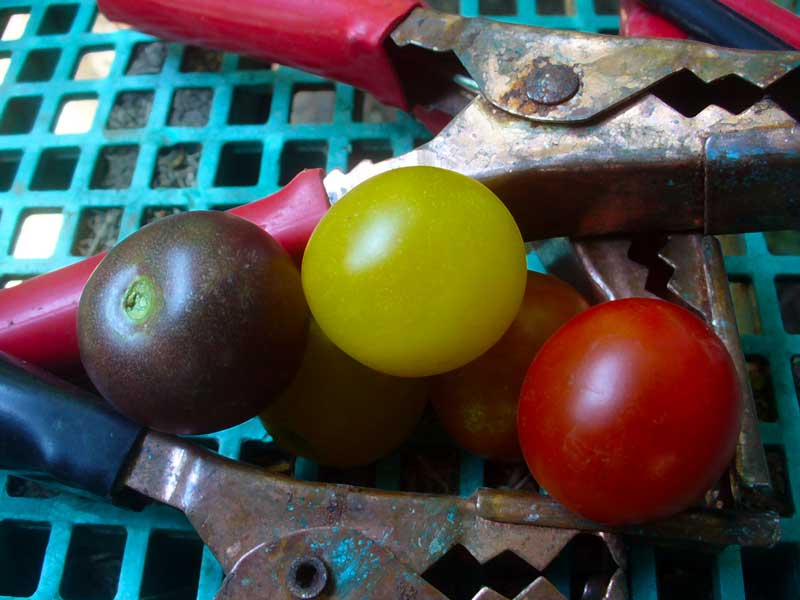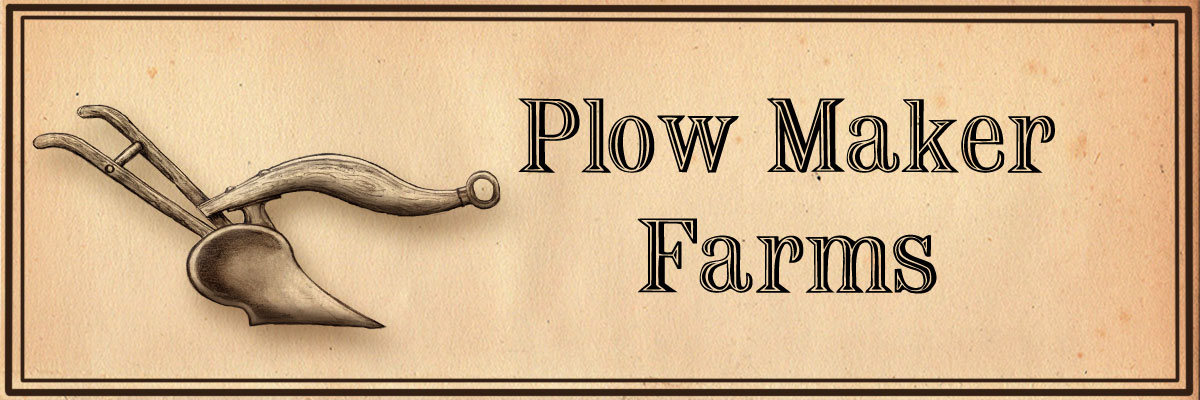Plow Maker Farms
Dr. Harvey Washington Wiley
One of the reason our food supply is safer than China's food supply is a single man, Dr. Harvey Wiley. A man of many talents, Wiley had a medical degree and was an analytical chemist with expertise in sugar chemistry. Due to his educational background, Wiley became concerned with the adulteration of syrups. This concern quickly spread to encompass the odd array of potentially dangerous additives being used in food products at the time. Peas were coated with copper sulfate to keep them green, babies teething syrups contained morphine, pressed cottonseed was sold as 'olive oil', beef was injected with formaldehyde to preserve it for storage, and everything was coated with borax.
Picture: All natural tomatoes.

Poison Squad Studies
From 1902-1907 Wiley studied the effects of preservatives and adulterated food on a rotating cast of 12-14 young male volunteers. His brave volunteers consumed a steadily increasing amounts of common food additives; stopping only when people became increasingly ill. Wiley called his study the 'hygienic table trials' but the George Rothwell Brown, a young Washington Post reporter, soon dubbed them the Poison Squad. As you can expect, this name quickly became popular in the press.
Not just anyone was selected to be a member of this squad. Volunteers had to be sober and reliable men of 'high moral character'. The men selected were healthy, athletic and willing to waive away their right to press charges if participation in the program resulted in death or injury. In return they received free board and free food laced with poisons.
Wiley had become discouraged that high-paid lobbyists from the packing and canning industries kept derailing his bills pushing for federal regulation of food additives. His official goal for his 'table hygienic trials' was to "investigate the character of food preservatives, coloring matters, and other substances added to foods, to determine their relation to digestion and to health, and to establish the principles which should guide their use." Unofficially, however, Wiley hoped to use the information to help enact radical food reform. Congress agreed to fund Wiley's study to the tune of $5,000.
The Poison Squad tested food additives such as borax, boric acid, sulfuric acid, sulfides, saltpeter, benzoic acid, formaldehyde, potassium nitrate, saccharin, salicylic acid, salicylates, benzoates, and copper sulfate. Doses of these food additives ranged from 1/5 gram to 4 grams. The men were required to record weight, temperature, and pulse rate before each meal and to list what they ate. Urine and feces samples were collected and analyzed. This information was used to monitor how chemicals were retained, excreted, or changed in their bodies and if any symptoms or side effects recorded could be attributed to ingesting those chemicals. The testing of each substance was only terminated when the men became to ill to function (stomach aches, nausea, vomiting, inability to do work). Over two weeks, half the men consumed food preservatives while the other half received the same diet sans poison. At the end of the two weeks the men's diets were switched.

Picture: It was shocking what Wiley found in food!
Obviously, the subjects suffered numerous side effects from these dangerous chemicals. These were so severe that half of the Poison Squad defected in the first year. Due to the notoriety of the experiment, though, there were always more human guinea pigs waiting to take their place. No deaths were officially attributed to these experiments; although one mother blamed it for her son's death. He had become ill and left the Poison Squad before his death in 1906.
Wiley's supervisor, Secretary of Agriculture James Wilson, wanted to expand the Poison Squad program to include babies and invalids, to monitor the effects of additives like borax on the "weak and sickly". Wiley had no qualms about testing potential toxins on young healthy men but he did draw the line at infants. He thought human experiments should be carried out on volunteers.
These trials demonstrated that many food additives were toxic or harmful to human health. One extremely scary example was copper sulfate which was used to keep canned peas a bright green. It caused nausea, vomiting, diarrhea, brain damage, kidney damage, liver damage and jaundice. Currently copper sulfate is used as a fungicide and soil additive.
Even with the evidence of an additive's toxicity firmly in hand, Wiley still had to confront the large food lobby who attempted to suppress his findings. The Secretary of Agriculture even suppressed several of the Poison Squad reports.
Luckily, the media was fascinated by the Poison Squad and eagerly reported any news coming out of the experiment. Concerned that the sensationalistic press would discredit his work, Wiley attempted a media black-out at first. However, cut off from accurate information the media released an outpouring of fanciful tales and rumors. Finally, Wiley gave up and begin to actively promote his Poison Squad. He later came to recognize the value of the press. Newspapers could print the information food lobbyists attempted to block.
Ditties and stories about the Poison Squad appeared in the popular press. Lew Dockstader wrote the following song, "They'll Never Look the Same":
"If ever you should visit the Smithsonian Institute,
Look out that Professor Wiley doesn't make you a recruit. He's got a lot of fellows there that tell him how they feel, They take a batch of poison every time they eat a meal.
For breakfast they get cyanide of liver, coffin shaped,
For dinner, undertaker's pie, all trimmed with crepe;
For supper, arsenic fritters,
fried in appetizing shade,
And late at night they get a prussic acid lemonade.
They may get over it, but they'll never look the same.
That kind of a bill of fare would drive most men insane. Next week he'll give them moth balls,
a LA Newburgh, or else plain.
They may get over it, but they'll never look the same." (Young)
Thanks to Wiley's efforts, and the popularity of Upton Sinclair's book, The Jungle, Congress passed the Meat Inspection Act and the Pure Food and Drug Act in 1906. It was the first federal law aimed at food regulation.
After retiring from the Bureau of Chemistry in 1012, Wiley became director of the Bureau of Foods Sanitation and Health for Good Housekeeping magazine. While in that position, Wiley fought to for tougher food safety laws. He lobbied for pure butter free from added water, more inspections for meat, and unadulterated wheat flour. Wiley developed the Good Housekeeping Seal of Approval, still in use today.
Wiley said in 1927 that any form of tobacco use might cause cancer. Due to his stance on this, Good Housekeeping magazine stopped accepting cigarette advertisements in 1952. This was a full twelve years before a report on the health hazards of cigarettes were issued by the US Surgeon General.
Known as "The Father of the Pure Foods and Drugs Act" Wiley was the founding father of the Food and Drug Administration.
Interesting look at the man himself:
Wiley was a self admitted misogynist in his early years and wrote some fairly unflattering portraits of women. He changed his way of thinking in his later years when he met and married a much younger women.
His wife, Anna Kelton, was an active suffragette. She was briefly jailed after a demonstration for women's voting rights. Wiley's 1930 book, W. Wiley: An Autobiography (Bobbs-Merrill), exposes his progressive leanings towards women's rights in a warm acknowledgement to his wife. By all accounts, their marriage was a happy one.
